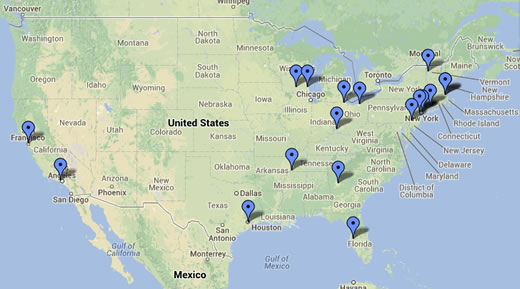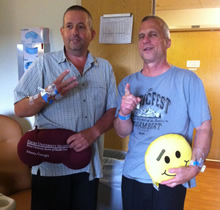A former pastor received the gift of life, thanks to a generous donation from one of his church members. But Gainesville pastor Troy Milford didn't receive his kidney from parishioner and friend Robert Poole; Milford received it from a donor in New Jersey. And Poole's donated kidney went to an anonymous recipient in Texas.
The two Georgia men are part of the world's second largest kidney swap in history, and the largest kidney swap to be concluded in less than 40 days. Named "Chain 221" by the National Kidney Registry, the chain involved 56 participants, which facilitated 28 transplants in 19 transplant centers across the U.S., including the Emory Transplant Center. A Good Samaritan donor, also known as an altruistic donor, initiated Chain 221 in Memphis, Tenn., on April 30, 2013, and the chain ended just five weeks later, on June 5, in Cleveland, Ohio.
According to the National Kidney Registry, this chain illustrates the enormous progress that's been made to shorten set-up times for large swaps, reducing the time patients must wait for a kidney transplant. Large swaps like these also increase the ability to find matches for highly sensitized patients who are extremely hard to match.
 | |
| Kidney recipient Troy Milford, Emory transplant surgeon Dr. Nicole Turgeon and kidney donor Robert Poole. |
For 10 years, Milford, a former pastor who also owns a poultry and cattle farm, had been battling polycystic kidney disease, a genetic disorder characterized by the growth of numerous cysts in the kidneys. He began dialysis in 2009 and was placed on the kidney transplant wait list in 2010. Several of Milford's family members were tested in hopes of donating their kidney to him, but they were not matches.
Milford's friend, Poole was then tested, but he wasn't a match either. That's when Poole learned about the Kidney Paired Donor Exchange Program at Emory University Hospital.
"Emory began its Kidney Paired Donor Exchange Program in 2010, and we have been participating in the National Kidney Registry since 2012," says Nicole Turgeon, MD, associate professor of surgery, Emory University School of Medicine and surgical director of the Paired Donor Exchange Program. "Paired donor exchange gives patients an opportunity to receive a living donor kidney transplant from a loved one or friend, despite incompatible blood types and positive crossmatches. In paired donation, a donor and recipient are matched with another incompatible donor and recipient pair, and the kidneys are exchanged between the pairs. This was the case with Mr. Poole and Mr. Milford, and the basis of how Chain 221 worked."
 |
| Interactive Map Named “Chain 221” by the National Kidney Registry, the chain involved 56 participants, which facilitated 28 transplants in 19 transplant centers across the U.S., including the Emory Transplant Center. See an interactive map showing the 19 institutions involved. |
Both Milford and Poole had surgery on the same day, April 30, at Emory University Hospital. That day Milford received his new kidney, while Poole donated his kidney to another person half way across the country, also in need of the new organ. Both men are doing well after their surgeries.
"Words can't say how it made me feel that Robert, who's not even related to me, would do this for me," says kidney recipient Milford. "I am one of 28 people who has a new kidney, and a new outlook on life, thanks to this swap. That's what God can do. He can work miracles."
 | |
| Kidney recipient Troy Milford and kidney donor Robert Poole. |
"Troy is a good friend and special person," says Poole, who manages a golf course in Canton. "He was too proud to ask for help, even when he was sick, so I am really happy I could assist."
"Emory is excited to be a part of the second largest kidney swap in history," says Turgeon. "Mr. Poole and Mr. Milford had two previous offers in chains that were cancelled. We are happy this swap went to successful completion with 28 people donating kidneys and 28 people receiving kidney transplants."
According to Turgeon, there are currently over 100,000 people on the kidney transplant waiting list. The discrepancy between the number of organs available and the number of people on the waiting list continues to grow. "Ultimately we want to bring awareness to living and deceased donation with this story," Turgeon explains.
Since the Kidney Paired Donor Exchange Program began at Emory, the hospital's surgeons have performed 27 kidney transplants.
The Emory Transplant Center is the state's largest transplant center performing the highest volume of kidney transplants in Georgia. In 1966, Emory performed the first Georgia kidney transplant. To date, the Emory Transplant Center has performed over 4,300 kidney transplants, with 247 kidney transplants performed in 2012.
